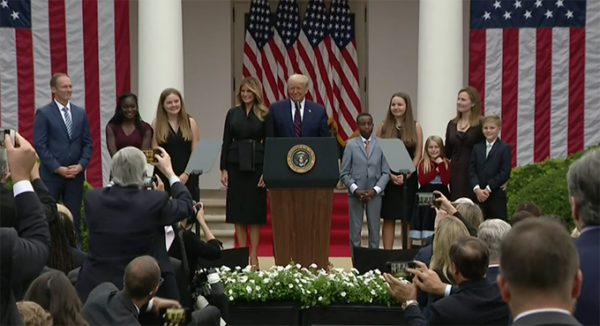WINDSOR TERRACE — Since she was nominated to the Supreme Court by President Trump, one can predict that Judge Amy Coney Barrett will be confirmed to the Supreme Court. Republicans have the necessary votes in the Senate, and yet, a fierce battle by Democratic lawmakers is brewing.
Thirty minutes after Barrett finished her remarks during her official nomination ceremony on Saturday, more than a dozen groups — some opposing her nomination, others supporting it — had announced advertising campaigns directed both at voters and legislators.
Political analysts have indicated that in the coming weeks more than $40 million will be expended trying to promote or derail the confirmation process for Barrett.
The nominee’s profound Catholic faith is at the center of the debate. “Seriously, they’re going after her Catholicism,” President Trump said Sep. 27.
“I will stand with her, fight with her,” he added, “and we will make sure that these attacks stop because they really — it’s unprecedented. They’re basically fighting a major religion in our country. This is incredible.”
It is not the first time Barrett has been attacked because of her Catholic faith. In 2017, during confirmation hearings for her nomination to the Seventh Circuit Court of Appeals, Senator Dianne Feinstein, D-Calif. and other members of the Senate Judiciary Committee pressed Barrett about her Catholic faith.

Senator Feinstein questioned Barrett about an article she had published arguing that Catholic judges should in some cases recuse themselves from death penalty cases due to their moral objections to capital punishment. “The dogma lives loudly within you, and that is a concern,” Feinstein famously told her. Many Catholic and conservative commentators criticized the anti-Catholic bias of the comment.
At the nomination ceremony, President Trump expressed his desire for a civil and respectful confirmation process in the Senate, but also indicated how polarizing the confirmation for Justice Brett M. Kavanaugh was in 2018. Democrat legislators will have a difficult time stopping the Supreme Court confirmation, but at the same time they feel the pressure from their base to do anything in their power to present this process just four weeks before the election as illegitimate.
Amy Coney Barrett also asked for civility in her remarks at the nomination ceremony. Paying tribute to the late justices Ruth Bader Ginsburg and Antonin Scalia, she said:
“Justices Scalia and Ginsburg disagreed fiercely in print, without rancor in person,” Barrett said. “Their ability to maintain a warm and rich friendship despite their differences even inspired an opera. These two great Americans demonstrated that arguments, even about matters of great consequence, need not destroy affection.”
Barrett also wanted to reassure senators and the public that she won’t be an activist justice pursuing a conservative agenda. “Justice Antonin Scalia’s judicial philosophy is mine too,” she said. “A judge must apply the law as written. Judges are not policymakers, and they must be resolute in setting aside any policy views they might hold,” she said.
Barrett, a Judge of the United States Court of Appeals for the Seventh Circuit, was a law clerk to the late conservative Justice Antonin Scalia and is known to be a conservative, pro-life Catholic. If confirmed, Barrett will be the sixth Catholic on the court, joining justices Clarence Thomas, John Roberts, Samuel Alito, Sonia Sotomayor, and Brett Kavanaugh.
The news of Barrett’s nomination to the Supreme Court will be particularly significant for the pro-life movement.
One of the main goals of the movement for 40 years has been supporting pro-life presidential candidates that would name pro-life judges to the Supreme Court. The hope behind this strategy is to reverse the 1973 Roe vs. Wade decision that ruled abortion falls under the right to privacy and is protected by the 14th Amendment to the Constitution. A majority of pro-life judges on the Supreme Court could make overturning Roe vs. Wade possible.
Barrett was born in New Orleans, Louisiana, in 1972. She studied at St. Mary’s Dominican High School and majored in English literature at Rhodes College, where she graduated magna cum laude. She then studied law at Notre Dame, where she graduated first in her class in 1997.
After graduation, Barrett worked as a judicial law clerk for Judge Laurence Silberman of the U.S. Court of Appeals for the D.C. Circuit and then for Justice Antonin Scalia of the U.S. Supreme Court from 1998 to 1999.
She is married to Jesse M. Barrett, a fellow Notre Dame Law graduate and a partner at SouthBank Legal in South Bend, Indiana. They have seven children. Two of their children were born in Haiti and adopted by the couple. One of the couple’s biological children is a special needs child.
Barrett has been a professor at George Washington University Law School and Notre Dame Law School.
She is respected even among people who disagree with her philosophy. In a mostly-critical profile today, New York Times columnist Adam Liptak said: “Judge Barrett’s judicial opinions, based on a substantial sample of the hundreds of cases that she has considered in her three years on the federal appeals court in Chicago, are marked by care, clarity and a commitment to the interpretive methods used by Justice Antonin Scalia, the giant of conservative jurisprudence for whom she worked as a law clerk from 1998 to 1999.”
Barrett’s confirmation process will further polarize the charged 2020 electoral campaign. Republicans and Democrats hope that the confirmation process will mobilize their respective bases for the coming election.

Congratulations Judge Amy Coney Barrett!! SO THANKFUL For Your Nomination!! May God Richly Bless You And Your Family!! ❤️❤️
KUDOS, Judge Amy Barrett for the nomination by President Trump to the Supreme Court. May God guide you in all your decisions. I’m Grand Knight of St. Anastasia Knights of Columbus Council # 5911 in Douglaston, and we all pray for your success.